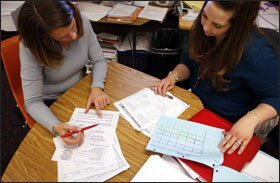When the Adams 12 school district in Thorton, Colo., introduced a new mathematics curriculum to elementary schools several years ago, district leaders turned to an idea both old and new to make the change a success. They created a position dubbed “student-achievement coach” that gives each school a skilled teacher ready to urge her colleagues forward in three areas: putting math across, helping English-language learners in the classroom, and using assessment to improve instruction.
Adams 12 already had coaches for the teaching of reading and writing, and so had experience with the progress teachers can make when help from an accomplished colleague is woven into their work.

“We think the coaching model has been a critical component in the rise of student achievement,” said Superintendent Michael F. Paskewicz, citing three straight years of growth in state test scores, including two years in which Adams 12’s increases outstripped those of the other districts in the Denver metropolitan area.
PD With a Difference
Educational fads come and go, but coaching for teachers is fast becoming a tool of choice for striving districts. That’s in part because of its success in districts like Adams 12 and in part because of a research consensus that, among those that schools can control, teachers are the most important factor in student learning.
It also reflects dissatisfaction with the standard ways districts have tried to help teachers get better. Workshops and courses, experts argue, don’t come close to doing the job. The assistance has to be sustained and as much a part of teachers’ daily work as possible, they say. Coaching fits that bill.
In the Adams 12 district, coaching is:
• Observing teachers and providing feedback
• Co-teaching and co-planning with teachers
• Facilitating professional development
•Covering classes so one teacher can observe another for short periods of time
Helping teachers find ways to use data and drive instruction
What coaching is not:
• Having your own students
• Acting as a teacher’s aide
• Doing individual student assessments
• Evaluating teachers
• Working as a substitute teacher
SOURCE: Adams 12 Five Star 69´«Ă˝
With old-style professional development, “there really isn’t any transfer to the actual classroom,” said Audrey A. Arellano-Davie, the director of professional development for Adams 12. “But to have a person on site, able to do problem-solving right there and part of the same community—we thought that was the most cost-effective way to build capacity.”
What Coaches Do
The exact responsibilities of teacher-coaches can vary by school or district. In the 39,000-student Adams 12 district, on the northern border of Denver, coaches do not have students of their own. Instead, their job includes observing other teachers in the classroom and offering feedback, team-teaching, helping teachers with planning, and facilitating professional development activities. On a more strategic level, they help teachers assess their students’ learning needs and map out lessons to meet those needs.
“I’m giving them key questions, steps, and looking at the instruction a little bit more deeply,” explained Melissa Jennings, a student-achievement coach at North Star Elementary School.
In Adams 12, coaches are paid the same as if they were regular classroom teachers, though in other districts coaches are paid more. In one sign of shifting budget priorities, the Dallas school district recently cut 88 central office positions in order to help pay for its coaching program, in which coaches get an extra $6,000 a year.
Continued Support Needed
Principals in Adams 12 are enthusiastic about the expanded program using student-achievement coaches, or SACs. All but two or three of the 30 principals surveyed in 2006, at the end of the student-achievement-coach program’s second year, supported it at the highest level. One principal wrote, “I would think twice about being at a Title [I] school without the assistance of a full-time SAC. … Our SAC has been instrumental in elevating the level of instructional mastery in order to move us off correctional-action status.”
In a survey the following year, another offered, “Teachers now believe that they can get kids, no matter what, to achieve in math. … They are being more thoughtful about what and how they are teaching.”
Still, experts caution that, for coaching programs to have sustained success they must have solid support—not always a given in times of budgetary uncertainty.

“I’m a big fan of coaching as a professional development strategy,” especially when it is combined with “learning communities” among teachers, said Richard F. Elmore, a professor of education at Harvard University’s graduate school of education.
But, Mr. Elmore warned, school boards don’t always understand the importance of having enough talented people doing the work or supporting them properly in the school and from the central office. So as a coaching program moves out of a pilot phase and costs go way up, it is hard to keep the money flowing, he said.
Coupled with that, Mr. Elmore argued, coaches won’t be effective in schools that lack the organizational capacity to take advantage of them, such as a focus on achievement and a good principal.





